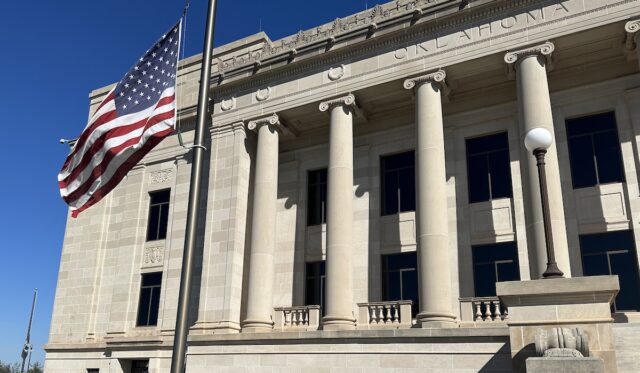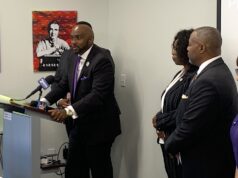

Without offering a reason, the Oklahoma Supreme Court denied a motion Tuesday from the State Department of Education and Superintendent of Public Instruction Ryan Walters asking to intervene in a case involving a potential Catholic virtual charter school. However, justices granted a similar motion from the school.
Attorney General Gentner Drummond filed a writ of mandamus Oct. 20 asking the Oklahoma Supreme Court to compel the Statewide Virtual Charter School Board to cancel its contract with St. Isidore of Seville Catholic Virtual School. The SVCSB voted to approve the new charter school in June and finalized its contract with the school in October, meaning it could open for the 2024-2025 school year. If it does, it would likely be the nation’s first religious charter school.
Although the Supreme Court had set a Nov. 28 hearing to decide whether to take up the case — called assuming original jurisdiction — that hearing was canceled after St. Isidore filed a motion to intervene in the case. Similarly, OSDE and Walters filed a joint motion to intervene. Drummond submitted an objection to OSDE and Walters’ motion to intervene Monday, and the court denied their motion Tuesday without explanation.
In his objection, Drummond called OSDE and Walters’ arguments that they should intervene because they are responsible for distributing school funding “bizarre.”
“[OSDE and Walters] do not have a protectable interest relating to petitioner’s claims,” Drummond wrote. “Rather, the movants bizarrely argue that the ministerial duty of correctly apportioning state aid funds to sponsored public charter schools and to all qualifying public schools pursuant to a legislatively-created formula is an interest that may be impeded or impaired by this original jurisdiction action. That is decidedly not the case. Petitioner’s prayer for a writ of mandamus compelling the Oklahoma Statewide Virtual Charter School Board to fulfill its legal duties and cancel its illegal contract with a sectarian institution in no way impacts the movants’ — or rather, the board of education’s — administrative duties, regardless of the outcome.”
OSDE chief political advisor Matt Langston criticized Drummond in a statement late Tuesday.
“The attorney general’s hostility not only to the religious freedom of millions of Oklahomans but also his desire to shut down any representation of their views in our state’s highest court is deeply disturbing and not in keeping with Oklahoma values,” said Langston, a political consultant who lives in Texas and who ran Walters’ 2022 campaign. “The Constitution and the Supreme Court are clear: we cannot discriminate on the basis of religion, and under Superintendent Walters’ watch, we will not. We look forward to continuing to defend the religious freedom of all Oklahomans at any time and in any venue.”
Langston’s statement comes one day after Walters said he and Drummond work “very closely” on various matters in a livestreamed interview with KOKH anchor Wendy Suares.
In the court order denying OSDE and Walters’ motion, justices did give Walters and the department permission to file amicus curiae briefs in the case.
On Tuesday, the court approved St. Isidore’s request to intervene in the case. Attorneys for the potential new school have until Nov. 21 to respond to Drummond’s original petition seeking the cancelation of the state’s contract with the religiously-affiliated entity.
Charter schools are public schools that can be privately run. Although Oklahoma’s charter school laws require schools to be “nonsectarian,” Walters, St. Isidore, members of the SVCSB and others believe recent U.S. Supreme Court decisions could call that clause of the law into question.
Others ask to intervene, file amicus briefs
Additionally on Tuesday, seven of the 10 plaintiffs suing the SVCSB over its decision to authorize St. Isidore filed their own motion to intervene in the case.
Represented by lawyers with a number of national groups — including Americans United for Separation of Church and State, the American Civil Liberties Union, Education Law Center and Freedom From Religion Foundation — the potential intervenors refer to themselves as “the taxpayers” in court documents and argue that they have a legal interest in ensuring their tax dollars are not spent unlawfully.
“Our clients’ proposed intervention would benefit the attorney general’s lawsuit because they are among the people — parents, students, families, educators, clergy, taxpayers, and a citizen of the Muscogee (Creek) Nation — who will suffer if a religious public school is permitted to open,” lawyers for the potential intervenors wrote in a joint statement announcing the filing. “They and their children will be excluded by the school’s discriminatory practices. They will be taxed by the government and forced to financially support a religion that many of them do not share. Their interests and diverse perspectives are valuable and will help the Oklahoma Supreme Court reach a just outcome.”
In their statement, the lawyers also said St. Isidore opening would mark a “sea change for our democracy.”
“The law is clear: Charter schools are public schools that must be secular and serve all students,” they said. “St. Isidore of Seville Catholic Virtual Charter School plans to discriminate against students, families, and staff and indoctrinate students into one religion.”
Adding to the flurry of filings in the case, the National Alliance for Public Charter Schools submitted an amicus curiae statement Tuesday asking the court for authorization to file an amicus brief “in support of the Oklahoma Attorney General’s position that Oklahoma cannot create state religious schools.”
Lawyers for that group argue the potential new school could jeopardize federal education funding for Oklahoma.
“The risk of losing federal funding to Oklahoma public charter schools in turn risks the Alliance’s nationwide mission to lead public education to unprecedented levels of academic achievement by fostering a strong public charter school movement across the country,” the attorneys wrote.




















